Budgetary cuts may lead to health district consolidation
Published 10:29 am Friday, March 6, 2015
RICHMOND
As part of an ongoing effort to close an $882 million revenue shortfall in the state’s budget, Virginia Governor Terry McAuliffe proposed consolidating the Western Tidewater and Chesapeake Health Districts at his annual budgetary meeting in December. Although the consolidation remains on track, as the House’s and Senate’s adopted budget reflects McAuliffe’s proposal, it has been heavily opposed by the Southampton Board of Supervisors and Western Tidewater Health Director Dr. Nancy Welch.
“Making these budget reductions has been the most difficult experience of my term so far,” McAuliffe said in a press release. “In a government as lean and well-run as ours, there are few spending cuts you can make without impacting the lives of Virginians. The goal was to keep lay-offs to a minimum and protect our core services.”
According to the governor, $246 million of the total shortfall must be found in this fiscal year, while $536 million will be needed in fiscal year 2016. The consolidation proposal would save the state more than $1.9 million over the course of the two years.
Improving business practices and efficiencies were among McAuliffe’s top themes during his budget proposal. This includes eliminating one field office, reducing vaccine inventory, transitioning health services in one health district from state support to local responsibility, changing criteria for the transport of cases to the Chief Medical Examiner’s office and reducing the use of wage positions.
Earlier this week, the board of supervisors reached out to Dr. Marissa Levine, state health commissioner for the Virginia Department of Health, regarding their “ardent opposition” to the consolidation proposal.
The board noted the dramatically different demographics, health characteristics and business operations between the two districts for their opposition to the matter.
“For instance, the median household income in Southampton County is 34 percent lower than in the City of Chesapeake, while our poverty rate is almost two times greater,” the supervisors wrote in a letter to the state health commissioner. “Furthermore, the teenage pregnancy rate and infant death rate are substantially higher in Western Tidewater and the dollars invested in public health services on both a per-capital and per-square mile basis are remarkably different in the two districts.”
Because of the stark disparities, the board believes that there is no synergy in consolidating the districts under one management structure.
“The modest budgetary savings included in the state budget will be at the expense of declining levels of service and diminished health outcomes in Southampton County.”
Welch echoed the board’s sentiment, noting her past experience covering multiple jurisdictions.
“There were far more similarities (in my past jurisdictions) than here,” she said. “I’m against it for a number of reasons, including the difference in poverty, income levels, population density, health issues and the insured versus uninsured percentage.”
Because of the dissimilarities of the districts and the fact that the proposal was a complete surprise, Welch is hopeful that the consolidation will ultimately not happen.
“I believe they’ve heard the message, and the word I’m receiving from those in Richmond is optimistic,” she said. “I’m going off of that optimism, and while I can’t say for a fact it won’t happen, we’ll find out when the budget is finalized in May.”






